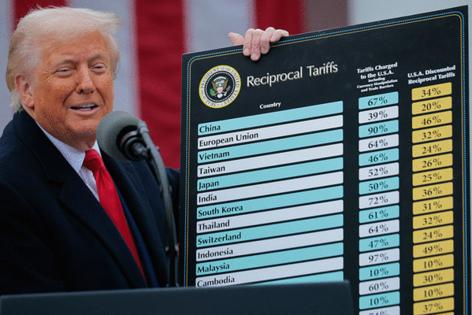China says US should revoke unilateral tariffs, denies talks
Published in News & Features
China demanded that the U.S. revoke all unilateral tariffs and denied there were talks on reaching a trade deal, maintaining a defiant stance despite President Donald Trump’s recent easing of criticism of the country.
“The U.S. should respond to rational voices in the international community and within its own borders and thoroughly remove all unilateral tariffs imposed on China, if it really wants to solve the problem,” Commerce Ministry spokesman He Yadong said at a regular briefing on Thursday in Beijing.
He also dismissed speculation that progress has been made in bilateral communications, saying “any reports on development in talks are groundless,” and urging the U.S. to “show sincerity” if it wants to make a deal.
The remarks suggest that President Donald Trump’s comments this week signaling that he could lower tariffs on China — which currently stand at 145% for most goods — will not be enough to de-escalate tensions. The U.S. leader said Wednesday that “everything’s active” when asked if he was engaging with China and that Beijing was “going to do fine” once talks had settled.
Trump has tried to get President Xi Jinping on the phone a number of times since he returned to office, but the Chinese leader has, so far, resisted. Beijing wants to see a number of steps from Washington before it will agree to trade negotiations, including showing more respect and naming a point person for the dialogue, Bloomberg News previously reported.
Other conditions include a more consistent U.S. position and a willingness to address China’s concerns around American sanctions and Taiwan, the self-ruled island that Beijing has vowed to claim someday, by force if necessary.
China has responded to Trump’s volatile tariff moves with caution, with Beijing calling the high levels of levies “meaningless.” Authorities have also warned other countries against striking deals with the U.S. that could hurt its interests.
Highlighting how the strain in trade ties is spilling into other areas of the relationship, China’s Defense Ministry on Thursday blamed the “biased” view of “some individuals in the U.S.” for hindering engagement between the Chinese and U.S. militaries.
Policy support
The focus now is on what policy support Beijing will unleash to shield the world’s No. 2 economy from the impact of tariffs on the export engine that drove some 40% of growth in the first quarter. Hints on stimulus could come as soon as this week, when the decision-making Politburo is expected to huddle, with its April meeting traditionally focused on the economy.
It’s “too early” for Beijing to go all in on policy support, according to Larry Hu, chief China economist at Macquarie Group. “After all, it’s much easier for Trump to walk back his tariff threat than it is for Beijing to walk back its stimulus announcement,” he added.
Beijing has typically dispensed stimulus only as it’s needed to protect the nation’s annual growth goal. With first quarter expansion coming in at 5.4% — above the about 5% target for 2025 — policymakers might feel they have room to wait.
The remarks from China’s commerce and defense ministries came hours after Pan Gongsheng, governor of the People’s Bank of China, warned of the threat ongoing frictions posed to trust in the global economic system, during Chinese officials’ first trip to the U.S. since Trump unleashed his biggest tariffs yet.
“All parties should strengthen cooperation and make efforts to prevent the global economy from sliding into a track of ‘high friction, low trust,’” Pan said at a Group of 20 meeting in Washington on Wednesday, according to a social media post by state broadcaster China Central Television.
Pan is one of the leading members of a Chinese delegation attending the annual meetings of the International Monetary Fund and World Bank this week in the U.S. capital, where discussions involving the U.S., E.U. and other G20 members are also taking place.
The events are expected to provide the first opportunity for Chinese economic officials to meet with Trump’s team in person since he drastically hiked tariffs on Chinese imports earlier this month, before any formal negotiations to cool trade tensions.
However, neither side has announced any bilateral meetings despite Trump’s move to soften his tone on tariffs that are expected to dent growth of the world’s second-largest economy.
There are “no winners in trade wars” and China will remain open to the outside world and firmly support free trade and the multilateral trading system, Pan said, according to the report.
-----------
With assistance from Lucille Liu.
©2025 Bloomberg L.P. Visit bloomberg.com. Distributed by Tribune Content Agency, LLC.







Comments